Troy Galow hadn’t planned to hunt that January day a few years back. But a friend of a friend was looking to shoot a “cull buck”—a nice but non-trophy animal, basically—and Galow, who makes his home in Liberty Hill, Texas, and has a deer lease on a ranch in the South Texas brush country, was happy to do what he could to give the guy his chance.
After dropping him off at one of the two Atascosa-style box blinds he maintains on the property, Galow parked his truck a little distance away and walked back. The guy was standing at the foot of the ladder, looking up.
“There’s something in the blind,” he said.
This came as unwelcome news to Galow, knowing that in South Texas “something in the blind” typically means either barn owls or undocumented migrants. The problem with the former is that they tend, in Galow’s words, “to make a giant mess,” and when a pair of owls exited the premises at his approach his initial thought was to drive to his other blind and hunt there instead. But dawn was beginning to break, revealing the spiky textures and muted greens, tans, and ochers of the brush country, and when he swept his flashlight across the interior of the blind and saw that it was unsoiled (meaning the owls couldn’t have been there long), he decided to stick with Plan A.
They set up facing north, looking down the long sendara (open lane) directly in front of them. After a while, though, Galow noticed that his guest, who was sitting to his right, kept glancing around him to their left, where another sendara extended through the brush toward a feeder pen.
“I think there’s a white dog near your feeder pen,” the guy said at last.
“I didn’t believe him,” Galow recalls. “I’d been hunting there for years, and I’d never seen a dog. I figured he might have seen a coyote, so I just said ‘Let’s stay focused on what we came here for, OK?’
“Well, he kept insisting he saw a dog, so I finally raised my binoculars, looked for myself, and saw this beautiful white bird dog going around and around the feeder pen. I’ve often wondered since then if she was attracted by the scent—a lot of quail and doves come there to feed on the corn—or if she was looking for something to eat.”
Deciding to cut the deer hunt short in order to try to corral what was almost certainly a lost dog, they jumped in Galow’s truck and drove towards the feeder pen.
“We stopped about 50 yards away,” he recounts. “The dog seemed pretty skittish, so I knelt down, said ‘C’mere, pretty girl,’ and she came right to me. She was skin-and-bones—her collar looked about ten sizes too big—and she was covered in ticks. The nameplate on her collar gave the name and number of her owner, William Masden, and also her name, Mazie.”
After calling the ranch manager to confirm that a lost dog had been reported in the area, Galow called Masden’s number and left a voicemail to the effect of “I have Mazie, your dog. She’s in rough shape, but she’s alive.”
Bill Masden, who lives in San Antonio, called back instantly. “How do you know it’s my dog?,” he asked.
“I’m looking at your name on her collar.”
Choking back tears, Masden said, “I’ll be there in two hours.”
It had been 21 days since Masden had last laid eyes on his dog. The third in an unbroken line of cut-from-the-same-cloth female English setters—dogs whose small size and sweetly affectionate dispositions belied the intensity and tenacity they brought to their job—Mazie was 35 pounds of high style and fiery purpose. Over the course of their partnership, they’d hunted from Georgia to Idaho and from Saskatchewan to Texas, pursuing a smorgasbord of gamebirds that included Huns, chukars, sharptails, prairie chickens, ruffed grouse, woodcock, pheasants and, of course, bobwhite quail.
The day before Mazie vanished, in fact, Masden and a friend, hunting on Masden’s quail lease near Tilden, Texas (roughly 20 miles from Troy Galow’s deer lease), had both killed 15-bird limits over her. The day the nightmare began, on the cusp of the Christmas holiday, they shot a few birds over one of his friend’s lanky pointers, then Masden suggested they give Mazie a turn. It was an act they’d played out thousands of times in hundreds of places, but this time, instead of the beeper collar that Mazie had always hunted with, Masden, at his friend’s urging, strapped a GPS tracking collar around her neck. He’d owned it for a while but had never used it before.
“How does this thing work?” Masden asked.
“You just turn it on,” his friend replied.
Except it’s not quite that simple. Masden turned on the “handheld” but, owing to his lack of familiarity with the unit, neglected to activate the collar itself. Over the years the sound of the beeper had become Mazie’s de facto “start” signal, and in its absence it took Masden several prompts to reassure her that she was OK to go. That’s when, in his words, “She shot off into a waist-high sea of grass—and I didn’t see her again for 21 days.
Perhaps the central mystery of Mazie’s disappearance is what happened to her immediately after the grass swallowed her up and why she didn’t come in, as
she’d always done before, when Masden whistled for her. You can speculate endlessly, but the answers to those questions, like the answer to the question of how Mazie survived those 21 days, will never be known.
What is known is that Masden searched night and day for her for the next 36 hours: on foot and in his truck, by the light of the sun and by the light of a headlamp, whistling, calling, blowing the truck horn, firing his shotgun into the air, doing anything and everything he could think of to get Mazie’s attention and toll her in.
Along the way he killed six rattlesnakes, saw several more, and bitterly pondered the dangers his little white dog—a dog who slept on his bed at night—was facing in that harshly unforgiving environment, a place still ruled by the law of fang and claw where even the vegetation bites back. He printed up a hundred “Lost Dog” flyers offering a substantial reward; some he sealed in Ziploc bags and duct-taped to ranch gates and oil field guard shacks, others he posted in cafes and feed stores. He made dozens of trips, 80 miles each way, back to the area; friends searched when he couldn’t. One particularly tech-savvy friend, Jennie Dallman, posted word of Mazie’s disappearance on Facebook and other social media sites. A few calls came in from people who claimed to have seen “a white-and-orange dog,” but while Masden followed up every lead they all proved to be dead ends.
He tried to stay positive, but he was all too keenly aware of the terror and confusion Mazie had to be feeling, lost, alone, and fighting to survive—if she was even alive. He was eaten up with guilt, too, knowing that a single careless, costly
mistake on his part had set this tragic chain of events in motion. This is a man, you come to understand, who holds himself to a blazingly high standard of responsibility; as he put it in an email, “I failed as a hunting dog owner.”
And then, early on a Saturday morning in January, Masden retrieved a voicemail from someone named Troy Galow.
They met on a road near Galow’s deer camp. As he describes it, “Mr. Masden got out of the truck, sat down cross-legged on the ground, and Mazie went right to him. She curled up on his lap with her belly up, and he just started to bawl.
“I’ll never forget something he said to me: ‘Troy, I’ve cried enough tears to flood San Antonio.’ It’s the most emotional dog story I’ve ever been a part of; when I think of all the things that had to break a certain way for me to find Mazie, I can’t help but think that an angel was looking out for Mr. Masden and her, and that I was chosen to be the one to reunite them.”
Masden’s joy was tempered, though, by Mazie’s appalling condition. Her nails, which Masden had trimmed weekly since she was a puppy, were grotesquely curved talons; clumps of hair had fallen out of her coat (likely as the result of sleeping in sub-freezing temperatures); her skin was stretched drum-tight over her ribs; she hosted a horrifying number of ticks. As Masden recalls, “I sat on the ground pulling ticks off her for four hours. There were so many ticks inside her ears that you couldn’t get a knife blade into them.”

Sadly, that became a lasting legacy of Mazie’s ordeal. While for the most part she regained her health (although the hair she’d lost on her back never
completely returned), her hearing was irreparably damaged by those ticks that had burrowed into her ears.
“We hunted together a few more times in open country where she could see me,” Masden explains. “But it was never the same for either of us.”
She remained his boon companion, though. And when you consider that she had the opportunity to point literally thousands of birds over the course of her career—and to retrieve a goodly percentage of them, too—it’s pretty clear that Mazie enjoyed the kind of rich, full, happy life that only a handful of dogs are lucky enough to experience. I’ll tell you this: If I were reincarnated as a bird dog, I’d want to belong to Bill Masden.
When Mazie died at the age of 17, Masden laid her on her favorite cushioned pad and buried her beneath a branching oak tree. He included several totems emblematic of their life together—a pair of 20-gauge shells, a brace of wild Texas bobwhites—along with a few articles of well-worn hunting clothing and his dog whistle.
He wouldn’t be needing them any more.

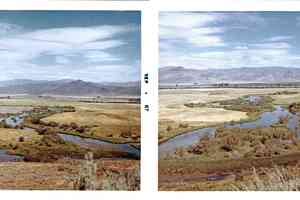





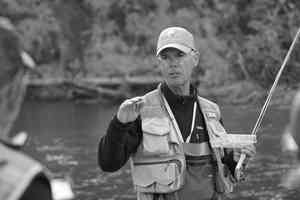



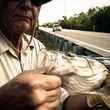



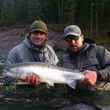


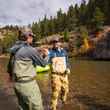



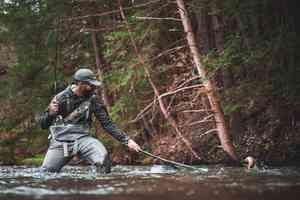

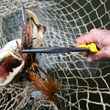
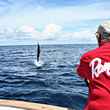





Comments
Glenn Dotter replied on Permalink
Wonderful story! My wife and I live at 9800' on a mountain near Cotopaxi Colorado. Similarly, I went up to my barn to get hay for my horses and laying on the bales was a beautiful hound. I spoke softly to him and as he growled, his tail wagged furiously. Figuring he was lost and thirsty, and could see skinny, I got some water and laid the bowl in front of him. He drank it all very quickly. I got him more with the same result. He no longer growled but that tail sure let me know he was grateful. The closest thing I had to dog food was a can of corn beef hash which I gave him. That didnt last long. Since it was very cold, I figured I better take him in our house. I said cmon and he followed me. My wife was shocked. I said I thought he was somebody's Lion hound. We tried ever name we could think of to call him but he only let us know he was grateful as he laid by ou wood stove. I called the only Lion hunting guide I knew but he wasnt missing any dogs but said he would make some calls. A short time later the phone rang and a young man said he had lost a dog 2 1/2 weeks prior. He described the dog. He told me he was 12 months old and I asked what the name of the dog was. He said Prince. I called Prince and the dog lit up and came. I told the young man we had his dog. When he arrive an hour later, Prince leaped off our porch and into his arms. The young man said he never figured he would see Prince again. Before Prince got into the truck he ran back to my wife and Me to say thanks. He made our hearts glow and the young man thanked us profusely. If you have ever owned dogs you can relate to the joy of getting a lost one back.
I am sure the Good Lord feels the same way when one of us "lost sheep" finds our way back to him.
Pages